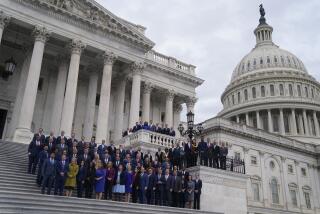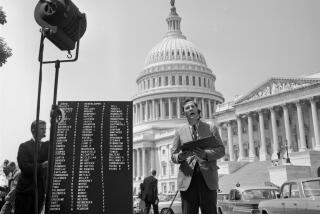OUR PAST STILL OUR PRESENT
All holidays memorialize something out of the past, but the Fourth of July tries to remember the whole American past. It’s not easy, out here in this most present and future of all cities.
The past is younger in Southern California: artifacts of yesterday’s Hollywood; echoes of a deeper yesterday in the Latin street names; painful reminders--triggered by a glimpsed vista like the thrusting rock forms along the Simi Valley Freeway--of a day when none of the glorious vistas had yet been invaded by civilization and its small constructions.
The Revolutionary War-Fourth of July past is inevitably easier to see in New England. Not from the turnpikes and throughways any more; efficient as they are, they are like transparent tunnels through greenery, somehow remote from the life that is actually only an off-ramp away.
But along the two-lane shunpikes, which I drove as often as I could across Connecticut, Rhode Island, Massachusetts and New York last month, the sense of that special past is near at hand.
There are the mill towns built along streams and rivers that are now merely decorative, the early 18th-Century churches with their sky-piercing steeples looking grandly overlarge for the small villages, the weathered saltbox houses constructed of that distinctive narrow clapboard. And everywhere through the long valleys are the cast-iron historical markers reminding you that contending armies camped and skirmished here.
You can trace the westering movement on the village signs, which always give their founding years, rising through the 1600s in Massachusetts and into the late 1700s in western New York state. Hammondsport, where I grew up, gives its date as 1794, so that its collective memory, so to speak, begins in the immediate post-Revolutionary period. There were Indian arrowheads to be found in the surrounding woods, and the past was never far away.
The first settler’s story was a cinch to bring the past alive. Sam Baker at 15 had been captured by Indians near Albany and delivered to the British Gen. Burgoyne, who made him a mess boy. When Burgoyne surrendered, a sympathetic officer gave Sam the equivalent of $2 and set him free. Sam joined a militia unit and saw some action in the West (near Ohio, that was).
After the war he became the first settler in the Tioga Valley near the New York-Pennsylvania line. A little later, in 1792, he acquired a 300-acre land grant in Pleasant Valley, near the Hammondsport that was to be. In due time he was the county’s first judge and he lived, stoutly prosperous, until 1842.
On the Fourth of July a sort of bi-coastal view has its usefulness. If it’s easy to feel yourself in the presence of the American origins, amid the rolling hills and elderly homesteads of the East, the projections--the inevitable implications--of the American experience are just as easy to see here in the West.
I suspect that Sam Baker might find some of the consequences of a free society astonishing and possibly even alarming. Not the technologies perhaps, although the technologies must continue to astonish even those of us who live with them every day. (Microchips; encyclopedias on a thumbnail; fiber optics and flybys of planets you can hardly detect with telescopes? Sam, even we ain’t seen nothing yet.)
I mean our multiracial society, speaking in tongues Sam hadn’t heard of and derived from countries that had not been born in his day. In sometimes uneasy harmony, we confirm the American birthright of freedom and openness. (We have not always been totally true to the birthright, although the founding philosophy has not ultimately been in doubt).
His United States of America was a half-century old when he left. A sturdy infant it was, although with economic problems at hand and a tragic conflict 20 years ahead. Yet the evidence of his letters is that he left with a sublime confidence in the future, the national destiny manifestly grand.
It might give Sam pause, as it does most of us, to understand that the Fourth of July, 1987, finds the U.S. destiny a little less manifest, the country riddled with debt, its competitive edge under sharp challenge, its image and its position in the world blurred and uncertain, whatever the rhetoric.
The sublime certainties of the past are at risk. We might even look with envy at a time when the simple skills of survival were enough, and a wilderness was there to tame and make abundant. Now nothing is simple, it would seem, neither the mechanics of daily living nor the answers to any of the world’s problems.
But Sam Baker appears to have been a man of common sense, shrewdness and sagacity, and if he were sitting today on his porch in Pleasant Valley in the fullness of his years, he might possibly conclude that certain fundamental things still apply and are simple.
He might, for example, argue that a case can still be made for the virtue and usefulness of hard work, and that an open society is infinitely preferable to a closed society, that mobility and choice are precious and that, not contradicting this in any way, we are also all part of and obligated to one another. He might well perceive that some of the problems of growth arise from our virtue of openness, and that our openness is still a beacon in the world.
Sam Baker might note that the Declaration of Independence is still in force, and relevant as ever, on a Saturday morning in 1987.
More to Read
Sign up for Essential California
The most important California stories and recommendations in your inbox every morning.
You may occasionally receive promotional content from the Los Angeles Times.










